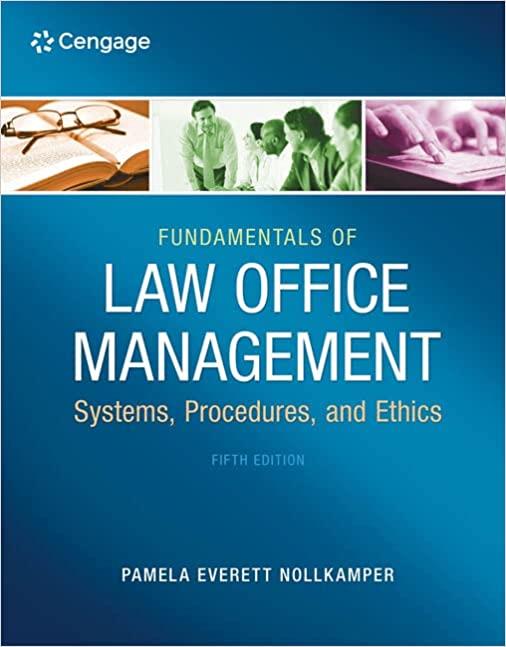Question
1.Trait theory is insufficient for identifying effective leaders because 1.not all leaders possess desirable traits 2.it fails to address situational variables 3.it was replaced by
1.Trait theory is insufficient for identifying effective leaders because
1.not all leaders possess desirable traits
2.it fails to address situational variables
3.it was replaced by behavioral theory
4.charisma cannot be learned
5.all of the above
Question 2
1.Leadership is sometimes irrelevant.
True
False
Question 3
1.Open-book management teaches employees
1.communication skills
2.financial skills
3.motivation skills
4.all of the above
5.none of the above
Question 4
1.The innovative organization is characterized by its ability to synthesize unique ideas.
True
False
Question 5
1.The idea that managers can sequentially mold employees behavior is known as
1.motivation
2.shaping
3.discipline
4.positive reinforcement
5.all of the above
6.none of the above
Question 6
1.Personality includes thoughts, feelings and behaviors.
True
False
Question 7
1.Mavericks should be encouraged not discouraged.
True
False
Question 8
1.The role of the leader is to
1.create a team of leaders
2.get results
3.practice self-management
4.constantly learn more about themselves, the workers and the situation
5.all of the above
Question 9
1.Culture change most likely occurs when
1.culture is strong
2.the organization has a long history
3.the CEO position is stable
4.the organization is medium to large size
5.all of the above
6.none of the above
Question 10
1.Perception represents self-reality.
True
False
Question 11
1.The antidote for social loafing is identifying individual effort.
True
False
Question 12
1.Some people are just not motivated.
True
False
Question 13
1.Openly communicating the cost of stealing is an example of which type of control?
1.employee discipline
2.feedforward
3.concurrent
4.feedback
5.open-book management
6.none of the above
Question 14
1.Expert power is the same as authority.
True
False
Question 15
1.The belief that the organization values employee contributions is called
1.job satisfaction
2.job involvement
3.effective management
4.perceived organizational support
5.values reinforcement
Question 16
1.A high need to achieve does not necessarily lead to being a good manager, especially in large organizations.
True
False
Question 17
1.Older workers tend to resist change more than younger workers.
True
False
Question 18
1.Employees who have an external locus of control tend to have high job satisfaction and performance.
True
False
Question 19
1.Innovative companies tend to tolerate risk, conflict and goal ambiguity.
True
False
Question 20
1.The first global factor for contributing to employee engagement is
1.pay and benefits
2.work-life balance
3.promotion opportunities
4.type of work
5.respect
6.co-workers
7.learning and development
8.office romance
Question 21
1.Which of the following EI definitions is not correct?
1.self-management is the ability to control your emotions and impulses
2.awareness of others' feelings is called empathy
3.persistence in dealing with mistakes and failure is self-motivation
4.awareness of your own feelings is self-awareness
5.managing the emotions of others is social skill
6.all of these are correct
Question 22
1.To be fair, managers should use the same rewards for different employees for the same level of performance.
True
False
Question 23
1.Interesting work is important to most workers regardless of their national culture or origin.
True
False
Step by Step Solution
There are 3 Steps involved in it
Step: 1

Get Instant Access to Expert-Tailored Solutions
See step-by-step solutions with expert insights and AI powered tools for academic success
Step: 2

Step: 3

Ace Your Homework with AI
Get the answers you need in no time with our AI-driven, step-by-step assistance
Get Started


